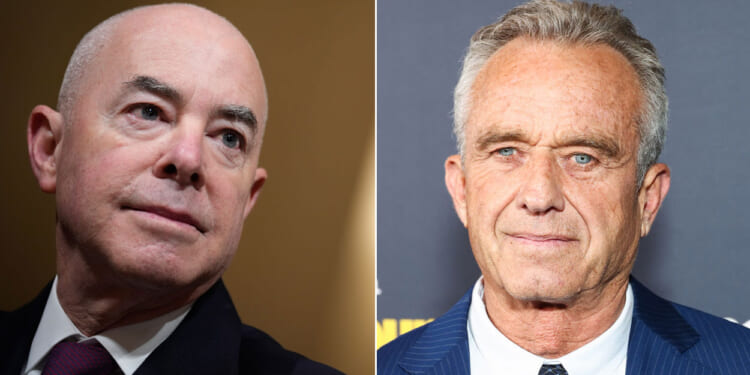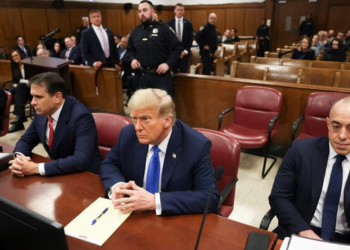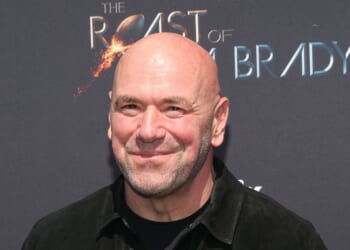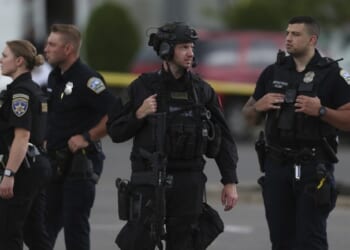Homeland Security Secretary Alejandro Mayorkas personally declined a request from presidential candidate Robert F. Kennedy Jr. for Secret Service protection last July.
The newly revealed records were obtained by Judicial Watch, which sued the Department of Homeland Secretary in September over an unanswered Freedom of Information Act request. On July 21, 2023, Mayorkas sent the following two-sentence letter to Secret Service Director Kimberly Cheatle:
On May 26, 2023, Candidate for President Robert F. Kennedy, Jr. submitted a request to the Department of Homeland Security for United States Secret Service protection. In accordance with the authority set forth in Title 18, United States Code, Section 3056(a)(7), and in consultation with the Candidate Protection Advisory Committee, I decline to identify Candidate Kennedy for United States Secret Service protection at this time.
Presidential candidates are eligible for Secret Service protection at the discretion of the homeland security secretary and a committee of congressional leaders. President Joe Biden also has authority to approve requests.
In his July 21 rejection letter, Mayorkas copied members of the Candidate Protection Advisory Committee: Senate Majority Leader Chuck Schumer, Senate Minority Leader Mitch McConnell, then-House Speaker Kevin McCarthy, House Minority Leader Hakeem Jeffries, and Senate Sergeant at Arms Karen Gibson.
Judicial Watch released the documents hours before the House of Representatives impeached Mayorkas for his failure to enforce immigration laws and lying to Congress. He now faces a Senate trial.
Kennedy, who entered the presidential race as a Democrat before switching to independent, has cited threats to his personal safety to justify his three requests for Secret Service help.
“I get a lot of threats, a lot of death threats,” Kennedy told Tucker Carlson in August. “About two weeks ago, a mentally ill person made it to the second story at my house. And that is very, very common.”
According to Kennedy’s campaign, the intruder who entered the candidate’s Los Angeles home had written hundreds of emails shared with the Department of Homeland Security, including one threatening to put a “bullet in [Mr. Kennedy’s] brain.” An earlier incident took place at a campaign event when a man showed up with loaded weapons and dressed like a U.S. marshal. Kennedy’s private security apprehended both individuals.
Kennedy’s campaign made repeated requests for Secret Service protection last year, according to the documents obtained by Judicial Watch. The first request came on May 26, 2023, accompanied by a 62-page “expert risk assessment.” Kennedy’s team followed up on July 7, 2023, with an “urgent request” for Mayorkas, only to be denied two weeks later.
The Secret Service began offering protection to presidential candidates after the assassination of Kennedy’s father in 1968.
Speaking to Carlson in August, Kennedy recounted an assortment of presidential candidates who were granted protection. They include Kennedy’s late uncle, Edward Kennedy, who was given Secret Service protection in 1980 even though he was challenging President Jimmy Carter, a fellow Democrat. In May 2007, after receiving a death threat, then-Sen. Barack Obama was given protection 18 months before the presidential election.
“We were not able to find a single presidential candidate who requested a protection from the president and was not given protection,” Kennedy told Carlson. “It’s just standard operating procedure.”
Republican presidential candidate Nikki Haley last week requested Secret Service protection.
In 2023 when he made the requests, Kennedy was polling around 20%. He still boasts the highest favorability rating of any presidential candidate—and the only candidate whose numbers are more favorable than unfavorable, according to 538.
Kennedy said the Secret Service were “wonderful” when his campaign first made the request.
“They were very, very encouraging, and they were very helpful at every step along the way,” he told Carlson. “I believe that their assumption was that they were going to get Secret Service protection.”
Last week, Judicial Watch revealed other documents related to Kennedy’s request, including an order from Secret Service Assistant Director Michael Plati instructing his staff not to respond to a request from Kennedy’s head of security.
Kennedy surmised the Democratic National Committee was responsible for “playing hardball,” requiring him to spend upwards of $200,000 per month on security rather than other campaign needs.
He is now asking supporters to sign a petition.












